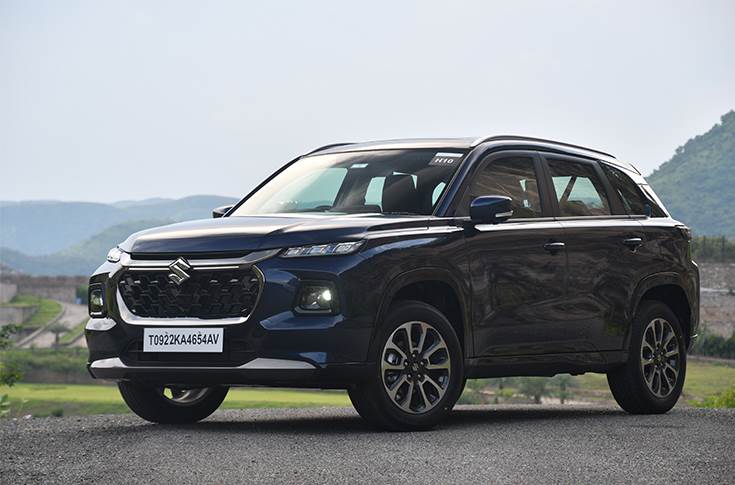India is graduating from small cars to upper-segment cars: Maruti Suzuki Chairman R C Bhargava
The chairman of Maruti Suzuki, R C Bhargava, says Indians are moving towards higher priced SUVs and MUVs and his company is in the ‘phase of transition’ to cater to this ‘shift in the composition of the market’.
Bhargava forecasts that the market for its ‘bread-and-butter’ hatchback segment is likely to decline in FY-24 in a market that is “set to grow by eight percent.”
Speaking to media post the Maruti Suzuki Q2 FY-23 earnings call, Bhargava said, “It is the result of the fact that there has been a shift in the composition of the market. We are moving away from a market which was predominantly small cars and hatchbacks, to a market which is more in the upper segment cars — the SUVs and MPVs.”
The chair of India’s largest carmaker attributed the decline of the small-car segment to the consistent degradation of buyer’s affordability.
“The overall hatchback segment has been on a declining trend for the last three years; the volumes of hatchbacks have fallen by 27-28 percent and the inflation has only made it worse. I expect the small-car segment to further decline next year,” said Bhargava. “We are, however, in a phase of transition,” he added.

The company introduced the second-generation Brezza compact SUV earlier this year in June and followed it up with foray into the fast-growing mid-size SUV with Grand Vitara rivalling Hyundai Creta in September. It has already secured over two lakh bookings of these SUVs.
It is now looking to showcase a new C-MPV, based on the upcoming Toyota Innova Hycross, at the Auto Expo 2023 in January next year.
On the transition to the higher priced vehicles, Bhargava said, “We will showcase the vehicles planned for launch in 2023-24 at the Auto Expo. These developments must happen as we, as a car manufacturer, must follow our customers. If the customer profiles and their needs are changing, we too must change with them,” Bhargava said.
The chairman of the largest car maker however clarified that this does not mean that the company is defocusing on the segment, as over 1.1 million hatchbacks are still sold in the country with 8-10 different vehicle options. Maruti Suzuki will continue to work on facelifts, minor changes and variants in the future.
In the first six months of this financial year, Maruti Suzuki sold over half a million compact cars posting a growth of 38 percent. This growth is on account of a low base and new model introduction.
“People with limited income are the hardest hit, and the sustained inflation will further make it difficult. They will take a longer time to build up resources to buy a car, but we do have the models in the entry-level segment for them,” said Bhargava.
However, with India’s passenger vehicle market consistently achieving record sales over the last three quarters, Bhargava showed optimism in overall demand and macro-economic parameters, despite fears of growing inflation around the world.
“Fortunately, in India, the inflation is not as bad as in other parts of the world. The Indian economy is doing well and the GDP growth is better than many global economies. We have reached a stage where the Indian market will touch the previous peak of FY 2018-19 and we expect the industry to grow by eight percent this year,” added Bhargava.
On its part, Maruti Suzuki has not given up on its target of achieving two million units’ sales this year.
“We are operating at 90 percent capacity utilisation – the only worry being the semiconductor supplies. We will try to match the industry growth,” Bhargava said.
Maruti Suzuki’s new plant in Haryana is expected to be commissioned by 2024. Maruti Suzuki said it is prepared to ramp up output at its existing facilities in Gurgaon and Manesar. The maker of Swift and Dzire can also access its alliance partner Toyota’s facility in Bidadi, on the outskirts of Bengaluru.
The Japanese auto major which claims to be the lowest carbon emission in the industry said it is well prepared to transition to BS VI phase II emission norms and almost half of its portfolio has already transitioned to upcoming RDE norms to be implemented by April 2023.
On the entry into EV space, Bhargava said, “I don’t think we started late, we are starting in a very systematic manner. We are localising much more, battery production, component production, we are keeping a watch on the infrastructure development too. We want to make sure the customer to whom we sell the car is looked after well and has no issue with service.”
Led by 35 percent volume growth in the July to September quarter, Maruti Suzuki posted four times growth in net profit to Rs 2,062 crore with revenues rising by 46 percent to Rs 29,931 crore.
While it continues to ride the wave of strong demand, as is evident from the 40 percent uptick in its 1,94,000-unit sales during the festive Diwali period alone, the company is also facing headwinds from the slowdown in the small-car segment that has impacted its market share.
